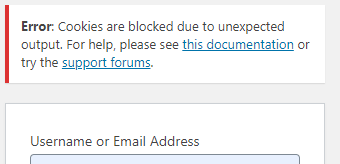I get the following error when trying to login:
Error: Cookies are blocked due to unexpected output.
I customized the wordpress core functions wp_hash_password() and wp_check_password() to use SHA1 algorithm for user authentification instead of MD5. I modified them in the pluggable.php file (not best practice but good for testing). The functions now look like this:
function wp_hash_password( $password ) {
global $wp_hasher;
if ( empty( $wp_hasher ) ) {
$wp_hasher = sha1( $password );
}
return $wp_hasher->HashPassword( trim( $password ) );;
}
function wp_check_password( $password, $hash, $user_id = '' ) {
global $wp_hasher;
// If the hash is still md5...
if ( strlen( $hash ) == 40 ) {
echo '<h2>'.$hash.'</h2>';
$check = hash_equals( $hash, sha1( $password ) );
if ( $check && $user_id ) {
// Rehash using new hash.
wp_set_password( $password, $user_id );
$hash = wp_hash_password( $password );
}
/**
* Filters whether the plaintext password matches the encrypted password.
*
* @since 2.5.0
*
* @param bool $check Whether the passwords match.
* @param string $password The plaintext password.
* @param string $hash The hashed password.
* @param string|int $user_id User ID. Can be empty.
*/
return apply_filters( 'check_password', $check, $password, $hash, $user_id );
}
// If the stored hash is longer than an MD5,
// presume the new style phpass portable hash.
if ( empty( $wp_hasher ) ) {
require_once ABSPATH . WPINC . '/class-phpass.php';
// By default, use the portable hash from phpass.
$wp_hasher = new PasswordHash( 8, true );
}
$check = $wp_hasher->CheckPassword( $password, $hash );
/** This filter is documented in wp-includes/pluggable.php */
return apply_filters( 'check_password', $check, $password, $hash, $user_id );
}
The conversion from password to SHA1 works perfectly aswell as the password check. I think a function responsible for setting the cookie is still using MD5. But I can't verify and can't find the function.
Does anyone has an idea on this?
Thanks in advance
Jan


wp_hash_passwordfunction has a bug,sha1returns a string, not an object. SHA1 also has the same problems MD5 does, attacks on the SHA1 hash algorithm have been known for ~15 years now